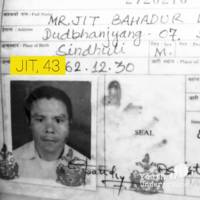
I arrived at the airport of Qatar on 18 February 2007. After waiting for 11 hours, someone finally picked me up from the airport. They brought me to a company which took away my passport and other documents. The employer asked me to sign another contract. I asked him what was written in the contract as it was in Arabic. He got angry and banged on the table with a hammer while he shouted that we had to sign the contract. I didn’t have any other option, so I blindly signed the contract. We were told that we’d get QAR 650 but we were paid only QAR 350. I had doubts about the pay slip so I went to head office and said I wanted to see my pay slip. We were surprised that the pay slip the contractor showed us was fake. Many workers are tricked by the employer and subcontractor. Nepali workers get QAR 650 while Indian workers get QAR 900 for the same position. We negotiated and the employer agreed to give us QAR 550.
I worked as a mason. The shelter given to us in the labor camp was very crowded as 12 people were staying in a room for 4 people. There was no food available and the cooking facilities were very poor.
I got up very early at 2 a.m. to prepare food for lunch. Our bus departed from the station at 4 a.m. The ride from the labor camp to the working site took 2 hours. We reached the working site at 6 a.m. I took the necessary tools from the warehouse and worked until 12 at noon. It was very hot. I ate the food I prepared that morning during my one-hour lunch time. At 6 p.m. our shift was finished and I returned the tools to the warehouse and took the bus. We reached the labor camp at 8 p.m. This was my routine for 2.6 years working in Qatar.
But that’s not the worst part. On 10 January 2008, I heard that my eldest son (14 years old) had a fatal bus accident. I cried and begged my employer to allow me to go back to Nepal. My employer did not allow me to return to Nepal. He said that if I went back to Nepal, I would have to refund 2 years of remuneration and the visa fee. It was impossible for me to pay. I felt bad and guilty. I was only able to return to Nepal on 27 March 2009.
Narrative source Youth Underground, a non-profit organization dedicated to preventing human trafficking through youth education, awareness-raising and advocacy.
Original narrative can be found here:
https://www.facebook.com/YouthUnderground.CH/posts/1695239050511563









